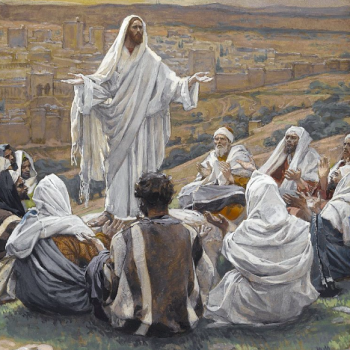If we do not serve the poor, the maimed, the lame, and the blind, we do not imitate the one whose name we claim. But even in such service we can find ourselves colluding with the world. . . . For we may allow the world to tell us what it means to live a Christian life, colluding with it in the way we understand our religion and its demands to serve.
How ought we to understand our relation to those powers? Is collusion with the Ahabs, Jezebels, and Pharaohs of the world justified or even required? Does Romans 13:1 or Doctrine and Covenants 58:22—"be subject to the powers that be"—require at least submission and cooperation, if not collusion?
The root of the word collusion (colludere) means "playing together." Of course the English meaning is not as innocent as that root might suggest. Neither was the Latin. We are a long way from that innocent meaning. But I draw attention to the word's root because collusion occurs more often than our aversion to the word might suggest. C. Terry Warner has shown well how, as individuals, we collude with one another in sin without recognizing our collusion, and we do so by playing together at something sinful.
For example, without ever explicitly saying I will do so or even thinking to do so, in a bad relation with another person I agree to continue give offense if she agrees to continue to offend. We sometimes see this kind of collusion in divorces. Or I implicitly agree to continue to overreact if he implicitly agrees to continue to provoke me. Looking back I see times when my then-teenage children and I colluded in exactly that way. In collusion, each of us blames the other person as a way of justifying and excusing our sinful behavior.
Sometimes we collude similarly with the oppressors of the world. We play together with them because we see no alternative, either because we wish there were an alternative but can see none available, or because we quite literally see nothing else as even possible. We take the order of things in the status quo—whatever that is—as the order that must be now. We may or may not recognize the status quo as something other than the ideal order. We may recognize that there is an ideal other than the status quo, but expect it to come only in some far, perhaps even apocalyptic, future. In Mormon terms, we may say "Consecration is for an indeterminate later time (D&C 49:20; 78:3-5; 105:5); tithing is good enough for now (D&C 119)."
As Christians we ought to ask ourselves, "To what degree are the social and political orders within which we live those of oppression and enslavement?" I think that if we are honest, we will have to recognize that our world, "the present world" (Titus 2:12), is very much a world that is ultimately an ungodly order of disordered desires, the world that endangers Jesus' followers (Jn. 17:9-19). Each of our present social, political, and economic orders—even the best of them—are variations within that ungodly world, a world into which we have been sent and within which Jesus has prayed that we might be sanctified (Jn. 17:17). The orders of this world are mostly orders of oppression and enslavement.
Thinking about the ways in which the present world is a world of oppression and enslavement should bring us to another question: "To what degree are we complicit with the order of Ahab, Jezebel, and the Pharaoh? Is my life within the world sober, righteous, and godly? Or do I collude with it to justify my behavior, only playing the part of someone who is godly?"
Do I live beyond my means or perhaps right up to them, unable to have any surplus income for good works, but blame advertisers (who are hardly innocent in this) for creating a consumer culture in which I have become enmeshed? "I would be glad to help the poor significantly, but living as I do—consuming in a month more than many in the world have for a year—I can't afford to."
Do I overlook the ways in which our political parties engage in colluding games with each other rather than work for the common good? Do I use my religion to justify my politics when my politics are more often than not a matter of tradition more than anything else? If I want, I can prooftext scriptures for my politics, referring to those that speak of freedom if I am on the right, or about justice or distribution if I am on the left. (Those on the right might refer to Mosiah 18:28 or D&C 98:8; those on the left to Psalms 82:3 or Mosiah 21:17.) Of course, when I prooftext to support my politics, I use scripture to serve Mammon. It is easy to collude with the world without having any idea I am doing so. It is sufficiently easy that I have to worry whether I am doing so.





